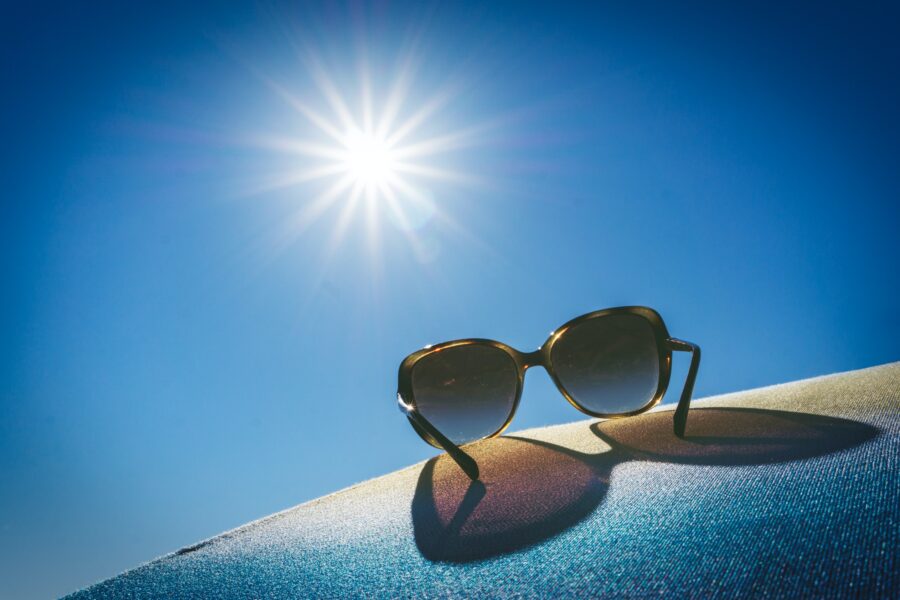
By: Kimberly Roberto
Until two years ago, you would have never found me without sunglasses on my head or in my purse. They were a mainstay for me, as they are for so many people. I was addicted to them because I “got headaches” when the sun was bright and had to squint. As with most people, putting sunglasses on my face made sense to protect it from that big yellow ball in the sky if there was bright sunlight.
As a result of constantly researching and learning about health topics and a bit of unexplained sudden enlightenment, I started reframing my outlook on sunglasses. I teach about the natural ability of your body to adapt to its environment and how your body knows exactly what to do in any situation. So, it dawned on me that I was interfering with my body’s ability to adapt to sunlight when I put that pair of sunglasses on my face. After all, I was putting a barrier between the rays of the sun and my eyes. Before I even understood everything thoroughly, I ditched the sunglasses. It didn’t take long before I noticed a couple of amazing things. 1) I wasn’t squinting and didn’t experience headaches anymore, and 2) My skin wasn’t burning, even without any sun protection and being in the sun over prolonged periods. Wow!
So why did I experience these things? It’s simple. I was trying to circumvent the body’s ability to adapt to being in the sun. Once I corrected my error, things changed.
What happens when you wear sunglasses?
On a sunny day, your eyes are exposed to the sun’s wavelengths, and your body starts preparing for sun exposure and gears up for Vitamin D production and melanin production. Therefore, sunglasses dim the amount of light and give the illusion to the body that there is minimal sun exposure. As a result, it does not prepare effectively, and Vitamin D production is inhibited. In addition, eyes will register the amount of sunlight they are exposed to and orchestrate the necessary processes accordingly.
Tan versus Burn
For example, the pituitary gland will trigger melanocytes in the skin to make more melanin. When your body produces more melanin, it creates darker skin (it is what makes you tan). This process is a natural protective mechanism. Said another way, if you inhibit melanin production, your skin is more prone to burn rather than tan. Ultimately, your body releases melanin into the cytoplasm, which “forms a melanin ‘cap’ around the genetic material of the cells. This protects DNA from further UV damage.” (1). This phenomenon explains why I no longer burn when in the sun, even for prolonged periods. Since melanin protects your skin from damaging UV rays, inhibiting it does not make sense.
The Sun and Your Eyes
Interestingly, you have cells in your retina (intrinsically photoreceptive retinal ganglion cells) that allow your body to sense changes in the intensity and quality of light. Sunglasses can also interfere with your natural circadian rhythm (your body’s natural internal biological clock). This problem, along with dozens of detrimental lifestyle choices, causes disruptions to one’s circadian rhythms. This disruption, in turn, can lead to depression, insomnia, seasonal affective disorder, mood swings, and more. Much documentation shows that people living in dreary areas without as much sun (think Seattle and London) are more prone to depression, seasonal affective disorder, and suicide. We are programmed for light and need to trust our bodies to handle the glorious benefits of the sun.
Your eyes are programmed to receive sunlight. When they don’t, they have to work harder to get it, putting an undue tax on your eyes as they seek light. This extra effort can lead to eye fatigue and could even lead to compromised eyesight over time.
The Windows to Your Soul
On a more metaphysical note, many say the eyes are the window to the soul. People are meant to communicate with other people while looking into their faces for body language and while looking into their eyes, not a pair of sunglasses.
The Cancer Connection
These issues also parlay into the skin cancer issue, which may be better suited for another article. However, I assert that skin cancer is an inside-out problem rather than an outside-in problem. I have been on a soapbox for decades, shouting about the dangers of sunscreens. One of many reasons is that it inhibits the production of Vitamin D, which is critical for cancer prevention. Like sunglasses, sunscreen circumvents the body’s natural processes (not to mention most are full of chemicals, many of which are carcinogenic). Melanin is also a natural antibiotic and free radical quencher, both of which have anti-cancer effects.
The bottom line Something as simple as wearing sunglasses can drastically and negatively affect your health. Trust your body and its natural, inborn, utterly amazing, God-given, innate ability to function in ways we cannot even begin to fathom.
(1) https://www.news-medical.net/life-sciences/Melanin-Production-Pathway.aspx
Other References:
https://explore.globalhealing.com/health-benefits-of-sungazing/
https://www.thenakedscientists.com/articles/questions/do-sunglasses-cause-sunburn
https://www.tylertolman.com/how-wearing-sunglasses-can-make-you-sunburnt/